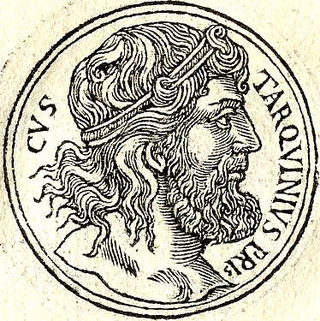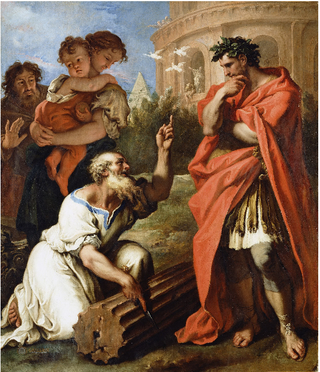
Lucius Tarquinius Priscus, or Tarquin the Elder, was the legendary fifth king of Rome and first of its Etruscan dynasty. He reigned for thirty-eight years. Tarquinius expanded Roman power through military conquest and grand architectural constructions. His wife was the prophetess Tanaquil.

Lucius Tarquinius Superbus was the legendary seventh and final king of Rome, reigning 25 years until the popular uprising that led to the establishment of the Roman Republic. He is commonly known as Tarquin the Proud, from his cognomen Superbus.

According to Roman tradition, Lucretia, anglicized as Lucrece, was a noblewoman in ancient Rome. Sextus Tarquinius (Tarquin) raped her. Her subsequent suicide precipitated a rebellion that overthrew the Roman monarchy and led to the transition of Roman government from a kingdom to a republic. After Tarquin raped Lucretia, flames of dissatisfaction were kindled over the tyrannical methods of Tarquin's father, Lucius Tarquinius Superbus, the last king of Rome. As a result, the prominent families instituted a republic, drove the extensive royal family of Tarquin from Rome, and successfully defended the republic against attempted Etruscan and Latin intervention.

Lucius Junius Brutus was the semi-legendary founder of the Roman Republic, and traditionally one of its first consuls in 509 BC. He was reputedly responsible for the expulsion of his uncle the Roman king Tarquinius Superbus after the suicide of Lucretia, which led to the overthrow of the Roman monarchy. He was involved in the abdication of fellow consul Tarquinius Collatinus, and executed two of his sons for plotting the restoration of the Tarquins.

Tanaquil was the queen of Rome by marriage to Tarquinius Priscus, the fifth King of Rome.

The Rape of Lucrece (1594) is a narrative poem by William Shakespeare about the legendary Roman noblewoman Lucretia. In his previous narrative poem, Venus and Adonis (1593), Shakespeare had included a dedicatory letter to his patron, the Earl of Southampton, in which he promised to compose a "graver labour". Accordingly, The Rape of Lucrece has a serious tone throughout.

Publius Valerius Poplicola or Publicola was one of four Roman aristocrats who led the overthrow of the monarchy, and became a Roman consul, the colleague of Lucius Junius Brutus in 509 BC, traditionally considered the first year of the Roman Republic.
Arruns Tarquinius was one of the sons of Lucius Tarquinius Superbus, the last King of Rome. Ancient sources differ as to whether he was the second or third son. In the earliest accounts, passed through fragments of the first Roman historian, Fabius Pictor, he is the third son. According to Livy and Dionysius of Halicarnassus, he is the second son. Modern historians doubt the historicity of the specific actions attributed to Arruns and other members of his dynasty, regarding them as highly embellished by later accounts.

The gens Tarquinia was a plebeian family at ancient Rome, usually associated with Lucius Tarquinius Priscus and Lucius Tarquinius Superbus, the fifth and seventh Kings of Rome. Most of the Tarquinii who appear in history are connected in some way with this dynasty, but a few appear during the later Republic, and others from inscriptions, some dating as late as the fourth century AD.
Demaratus, frequently called Demaratus of Corinth, was the father of Lucius Tarquinius Priscus, the fifth King of Rome, the grandfather or great-grandfather of Lucius Tarquinius Superbus, the seventh and last Roman king, and an ancestor of Lucius Junius Brutus and Lucius Tarquinius Collatinus, the first consuls of the Roman Republic.

Sextus Tarquinius was one of the sons of the last king of Rome, Lucius Tarquinius Superbus. In the original account of the Tarquin dynasty presented by Fabius Pictor, he is the second son, between Titus and Arruns. However, according to Livy and Dionysius of Halicarnassus, he was either the third or first son, respectively. According to Roman tradition, his rape of Lucretia was the precipitating event in the overthrow of the monarchy and the establishment of the Roman Republic.

Lucius Tarquinius Ar. f. Ar. n. Collatinus was one of the first two consuls of the Roman Republic in 509 BC, together with Lucius Junius Brutus. The two men had led the revolution which overthrew the Roman monarchy. He was forced to resign his office and go into exile as a result of the hatred he had helped engender in the people against the former ruling house.
Arruns Tarquinius was the younger son of Demaratus of Corinth, who migrated to the Etruscan city of Tarquinii in the seventh century BC. He died shortly before his father, leaving his wife pregnant. When Demaratus died, he left no inheritance for his grandson, also named Arruns, who was thus born into poverty, although Demaratus had been wealthy. The child came to be called Egerius, meaning "the needy one."

Arruns Tarquinius, commonly called Egerius, was a member of the royal family of early Rome.
The Battle of Silva Arsia was a battle in 509 BC between the republican forces of ancient Rome and Etruscan forces of Tarquinii and Veii led by the deposed Roman king Lucius Tarquinius Superbus. It resulted in victory to the nascent Roman Republic.

Titus Herminius, surnamed Aquilinus, was one of the heroes of the Roman Republic. He participated in two of the most famous conflicts that attended the birth of the Republic, and was elected consul in 506 BC. However, his greatest fame was won as one of the defenders of the Sublician bridge against the army of Lars Porsena, the King of Clusium.
Arruns Tarquinius was the brother of Lucius Tarquinius Superbus, the seventh and last King of Rome.
Titus Tarquinius was one of the sons of the last king of Rome, Lucius Tarquinius Superbus. According to Livy and fragments of the first Roman historian, Fabius Pictor, he was the eldest son; however, Dionysius of Halicarnassus claims he was not.
The overthrow of the Roman monarchy was an event in ancient Rome that took place between the 6th and 5th centuries BC where a political revolution replaced the then-existing Roman monarchy under Lucius Tarquinius Superbus with a republic. The details of the event were largely forgotten by the Romans a few centuries later; later Roman historians presented a narrative of the events, traditionally dated to c. 509 BC, but it is largely believed to be fictitious by modern scholars.
Arruns Tarquinius may refer to:









